Bibi Speaks

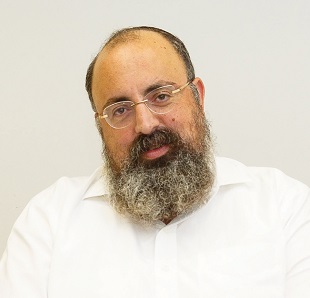
Binyamin Netanyahu opens up to Mishpacha in an exclusive interview
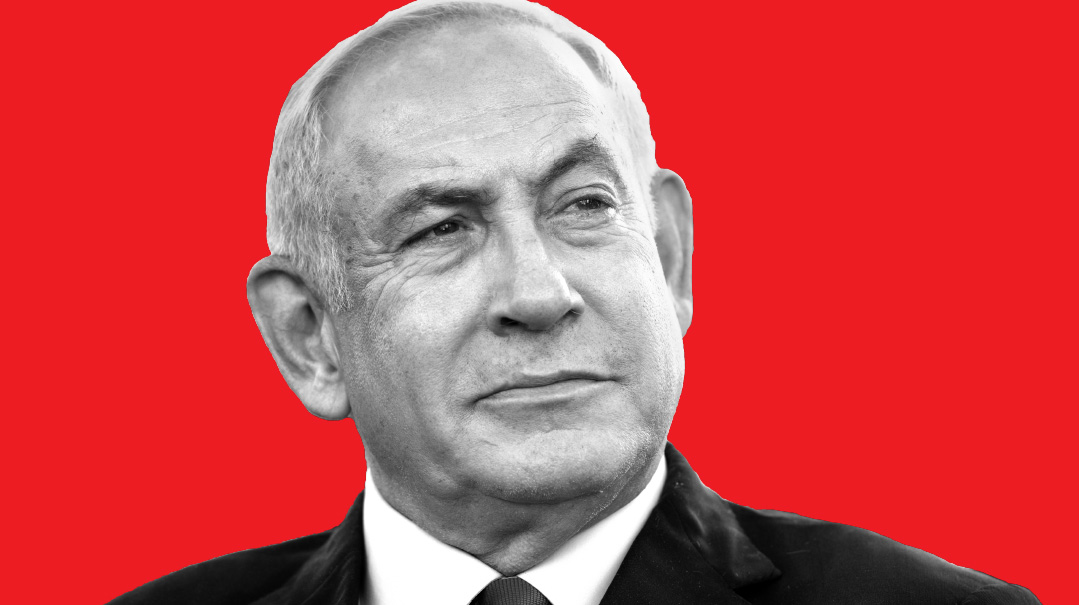
After a tough year in the opposition, and now within striking distance of retaking power, Binyamin Netanyahu opens up to Mishpacha in an interview, laying down an unapologetically religious-right agenda for his next government, and excoriating Yair Lapid for mistakes in the struggle with Iran. He addresses Israel’s skyrocketing housing prices, a major stumbling block for young Jews planning aliyah; promises to pull Israel out of the global economic crisis, as he did with Covid; and vows once again to take the fight against the Iran Deal to Congress — despite his longstanding friendship with President Biden. But he warns that none of this will happen if right-wing voters stay home on Election Day
IFTel Aviv, the city that plays host to the Likud Party headquarters, is the city that never sleeps, Bibi Netanyahu – the building’s most famous occupant — doesn’t seem to rest either.
For the fifth time in three years, Binyamin Netanyahu is storming toward a fifth term as prime minister, younger in spirit than his competitors and fresher than all his rivals. Days packed with campaign rallies up and down the country conclude in the “aquarium” — the secure office area at party HQ where he confers with his aides.
His Schadenfreude with the three-way split among the Arab parties is matched by his confidence; he’s sure he saved the right from a stinging defeat by forcing unity on the chareidi and dati-leumi parties, two bases without which he’ll never see the inside of the prime minister’s residence again.
The interview takes place at an early hour of the morning, after Netanyahu spent all night reviewing final edits on his autobiography, Bibi: My Story, to be published shortly after the elections.
As the son of a historian, Netanyahu has a healthy respect for the written word, and he insists on approving every minor change to his book. Bibi chooses his words carefully during our conversation as well (“Your first interview with a chareidi magazine in a decade,” as one of his aides tells him in our presence). He’s careful not to annoy his natural allies, but also avoids taking shots at his opponents and playing into their hands.
Throughout our interview, Netanyahu seems comfortable. As far as he’s concerned, the campaign’s first stage has been a rousing success. On every item within his power, up to meeting the deadline for registering lists, Netanyahu has delivered the goods. His opponents have done the rest.
Netanyahu still has two goals. The first is to maximize support for the parties in his bloc by raising turnout in right-wing strongholds by 5% to 10%. He will also do everything he can to depress turnout in the Arab sector.
His second goal is to make Benny Gantz, currently defense minister and chair of the National Unity Party, as unpalatable to the chareidi and right-wing street as Yair Lapid is. He’s devoting considerable energy to shoring up what he perceives as his primary weakness: the fact that the right-wing base is not sufficiently allergic to Gantz.
Working in Netanyahu’s favor is that Gantz has so far utterly failed to make this election campaign a three-horse race. The chareidi card is Gantz’s last resort, a bid to position himself as a compromise candidate, should the upcoming election fail to break the deadlock that has plagued Israeli politics these last three years.
Netanyahu is hitting at Gantz’s weak point with all his might — to make Gantz not only electorally irrelevant (as the polls already show) but a nonstarter for chareidim. Netanyahu will remind everyone that Gantz is a full-fledged leftist who boosted Abu Mazen and breathed new life into the two-state solution while Jews were being murdered, and he’ll remind chareidim that Gantz put their faces on campaign posters above Tel Aviv’s Ayalon Highway and added bête noire Matan Kahana to his Knesset list.
Before the deadline to register party lists for the election, Netanyahu had devoted considerable time to patching up the disagreements between the litvish Degel HaTorah and the chassidish Agudas Yisrael factions, ensuring that they would once again run jointly under the United Torah Judaism banner. Since then, he’s spent even more time with the Ashkenazi chareidim — to head off any possible support for Gantz in the election.
Ze’evi Fleischman, a graduate of Ateres Yisrael who became Netanyahu’s close advisor and presided over the UTJ “peace process,” arranged meetings over the chagim in Bnei Brak and Jerusalem with the chareidi spiritual leadership under Rav Gershon Edelstein.
Even those in the chareidi world whose eyebrows were raised when Bibi undertook the “peace process” now understand that he helped bring the chareidi community out of a very awkward position. His strong relationship with Deri, who was also actively involved in resolving the UTJ dispute, requires no elaboration. But Netanyahu also has close ties with Degel head Moshe Gafni and new Agudah leader Yitzchak Goldknopf.
Having forged chareidi unity, Netanyahu now turns to the final stretch of the campaign: the fight of his life. In this battle, there is no tomorrow; Bibi knows the only way to survive is to get to 61 seats.
Netanyahu sits down for our interview after what he regards as a “lost year,” during which the “change government” made mistakes in every conceivable area: diplomatically, by mishandling relations with the Biden administration and the emerging nuclear deal; economically, by failing to deal with an unprecedented rise in the cost of living that has made the “Promised Land” the most expensive in the West; security-wise, by stumbling in response to an unprecedented terror wave; and by laying siege to the Jewish identity of the state in every area of life.
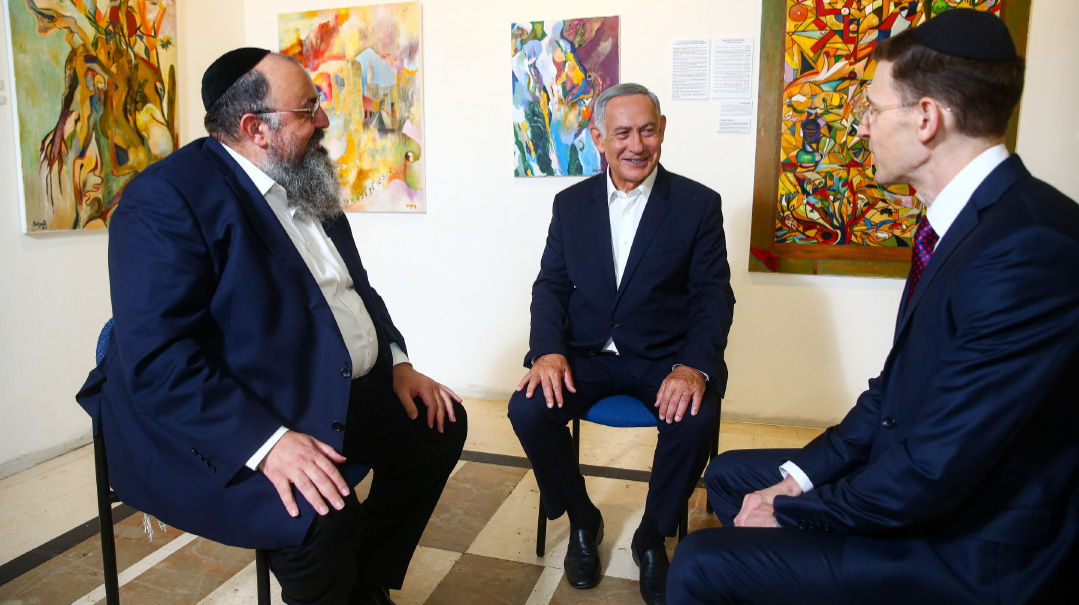
Counting on Votes
Netanyahu knows very well that after Finance Minister Avigdor Lieberman slashed funding for their educational institutions, and Religious Affairs Minister Matan Kahana threatened to rip up the status quo, chareidim won’t be able to survive another term in the opposition. If chareidi politicians say this, they will play into their opponents’ hands; but Netanyahu knows as well as they do that there’s no third option.
We saw you working around the clock to unite the right-wing bloc’s parties. In light of the parallel splits on the left, can we treat you with cautious optimism as the next prime minister?
“That depends entirely on right-wing voters. If right-wing voters who stayed home in the last election get out and vote this time, we’ll be able to form a stable right-wing government for four years, and this depends entirely on the voters. I remember that in the last election, some right-wing voters told themselves: ‘It isn’t necessary to vote, I’ll go shopping — what’s the worst that can happen?’
“Well, we all saw what happened. We got a dangerous government that allowed prices to soar uncontrollably, that compromised our state’s Jewish character, our national pride, and our personal security. A government that allowed Iran to race toward a bomb as never before. If every one of us takes this election personally and goes out to vote, I believe this time we’ll win.”
Can you explain to bewildered overseas readers who’ve been following Israeli politics over the past three years, what are the internal polls that you’re seeing saying about the bloc’s chances in the upcoming fifth election?
“We’re very close to a stable right government for four years. We see this clearly both in our internal polls and in the ones published in the media. The choice between the continued devaluation of the State of Israel by a weak government dependent on the Muslim Brotherhood [i.e., Ra’am] or the Joint List and four years of a stable right-wing government lies in the hands of right-wing voters alone. If everyone turns out to vote this time, right-wing voters, Likud voters, Shas voters, UTJ and Religious Zionist voters, we’ll form a strong and stable government for four years and avert sixth elections.”
Let’s talk about what happened in the two weeks before the deadline for registering Knesset lists. You started by throwing the dati-leumi factions of Itamar Ben Gvir and Bezalel Smotrich back together, and we have to ask whether in the long term you’ve legitimized Ben Gvir and brought him into the mainstream.
“I represent the Likud and those who believe in Israel as a Jewish state. If I have to choose between someone who believes in the State of Israel as the nation-state of the Jewish People, who supports IDF soldiers, who believes in our right to the Land of Israel and in the Jewish character of the state — and Mansour Abbas, Ahmed Tibi, or Ofer Cassif, who deny Israel’s existence as a Jewish state — then the choice is clear.”
From kippot serugot to black yarmulkes. You sat for hours with roshei yeshivos and prominent public figures and exerted all your influence to ensure that UTJ ran a united list. We heard from a few of the Torah world’s donors that they received 2 a.m. phone calls from you. Why did you fear that a split between Degel and Agudah was a concrete possibility this time, unlike in the past?
“I know that massive pressure was exerted to lead to a split between the chareidi parties so that one of them would collapse and slip under the threshold. In that event, we wouldn’t have stood a chance, and the road to another dangerous government dependent on the Muslim Brotherhood and the Joint List would have been very short. So I thank everyone who was involved in helping us avoid this disaster and preserving a unified national camp.”
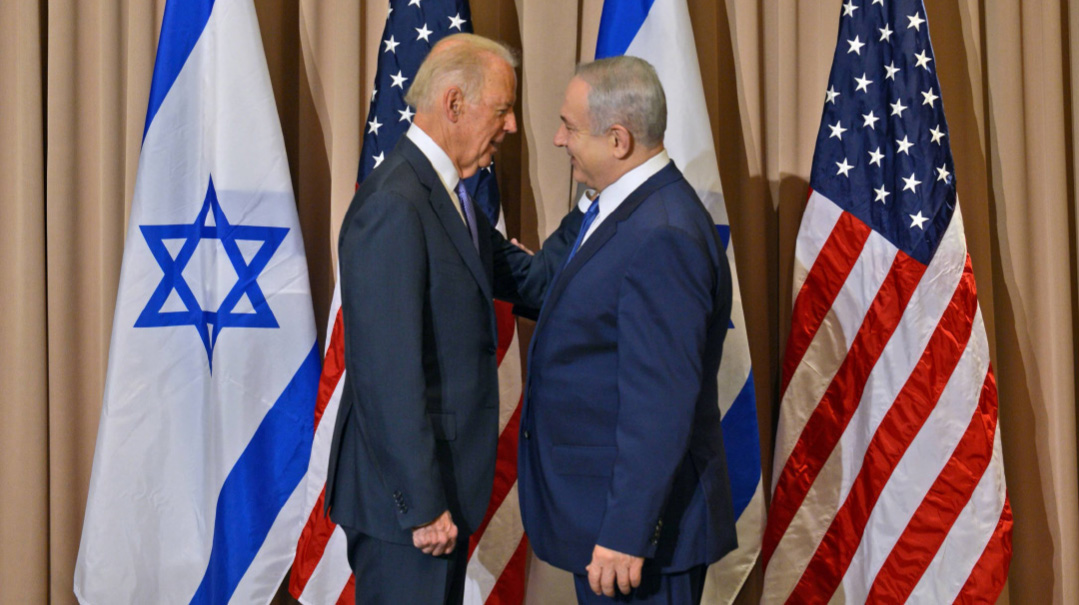
An Unambiguous Guarantee
In the current campaign, Netanyahu has been wary of playing into his opponents’ hands. He has no intention of addressing recent trolling by Avigdor Lieberman, who accused him of employing the methods of Stalin and Goebbels. As far as Netanyahu is concerned, his opponents’ biggest threat was foiled when the party lists were finalized, and he has no intention of boosting their profile by making personal attacks before the elections.
Netanyahu has been wary of promises when it comes to matters of religion and state, as well. But one issue close to the heart of chareidi voters did come up in a recent campaign statement, one that he had never made before: an unambiguous guarantee of budgetary equality between secular and chareidi children, without lowering his head before the media onslaught.
And how do you respond to the media onslaught against you for allegedly pledging to fund chareidi institutions that don’t teach the core curriculum? In retrospect, wasn’t it a mistake to let this all come out in public and give your rivals campaign ammunition?
“There’s a lot of lies and fake news. The status quo was preserved. Institutions that teach the core curriculum will continue to do so. I’ve always acted to integrate the chareidi community into the workforce, and I believe in this fantastic community’s tremendous abilities to contribute to Israeli society, alongside the concern for keeping Torah study alive. I’m proud of the fact that thanks to the policies we led, we brought the share of chareidi women who work to parity with that of the general public. There’s still a lot to be done, and we’ll do it through discussion, mutual respect, and cooperation.”
It was a very strange business — a dispute within UTJ being mediated by the head of the right-wing bloc and the chairman of the Sephardic Shas party, who even offered to include Belz in the Bnei Yosef network. And out of this whole mess, Belz got nothing but promises on paper.
“I see it very differently. ‘Out of this whole mess,’ as you put it, we foiled an obvious plot to break up UTJ in order to cost the right four seats, and ensured that the upcoming election won’t give Lapid’s dangerous government another term to erode the Jewish character of the state.”
To wrap up this subject, we have to ask you, as the prime minister for over a decade consecutively, with the chareidim in your government for most of that time, how did we reach a point where the chareidi community’s education budget was worn so thin? How did children who learn Torah end up caravans? What mistake did your government make with respect to the chareidi child, and how do you propose to fix that if you return to power?
“Don’t ask me. Ask the chareidi MKs, and they’ll tell you what a period of flowering it was for the Torah world. And now we’re coming to continue fixing the injustice and discrimination of years, and we’re doing it with courage in the face of dishonest smears from the media and various political parties. My goal is for a chareidi child to get everything that a secular or dati-leumi child gets. At the end of the day, we’re one people, our children are everyone’s children. We love everyone without discrimination.”
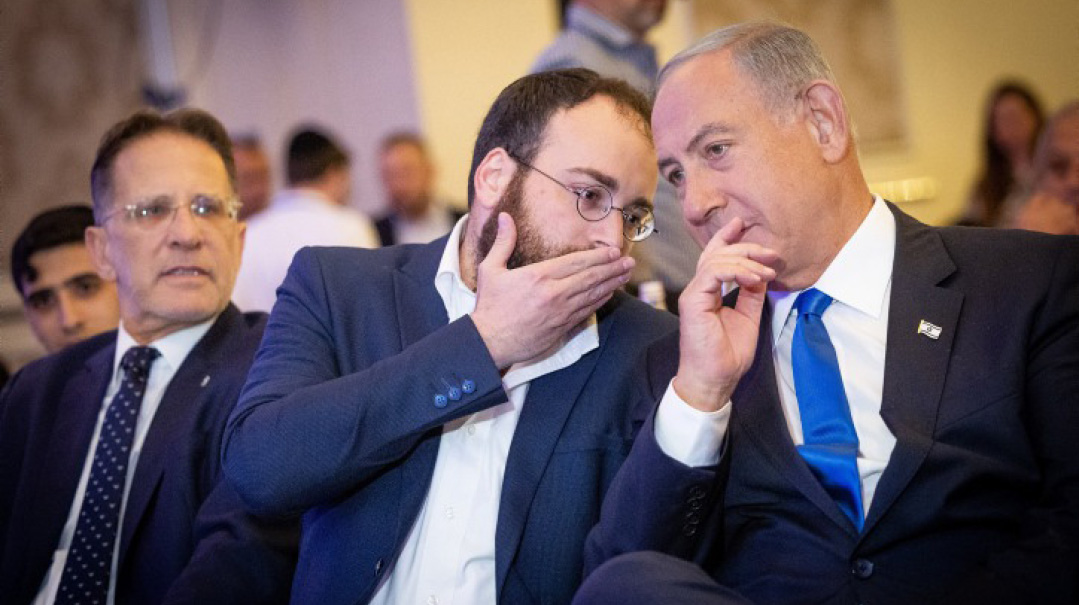
Unbridgeable Gulf
Meet the new Bibi of 2022: he doesn’t apologize, and he doesn’t hesitate to demand equality for chareidi children in the face of media incitement.
Netanyahu enjoys quoting Rashi’s commentary on the pasuk “v’olech etchem komemiyut — I made you go upright,” in order to illustrate the right’s growing strength. All attempts to unravel the bloc — through bribes, financial incentives, and jobs — hit a brick wall. After an entire year in which the left broke all the rules and violated political norms, the right has no intention of playing by the same rules if it returns to power after the election.
There’s no hesitation in Netanyahu’s rich baritone voice when he’s queried about his intention to form a completely right-wing government with Itamar Ben Gvir of Otzma Yehudit as a minister. Unlike in the past, when Netanyahu preferred unity governments with the center and left, this time, it seems, the choice between right and left is stark.
Lapid is trying to shore up the mainstream Arab parties by getting the Balad party’s run struck down, hoping the High Court will do the job for him. But this process would have to start in the election commission, and would therefore require your support. Will the Likud play into Lapid’s hand by supporting the banning of Balad?
“As far as the Likud is concerned, we see no difference between Ra’am, Balad, Chadash, and Ta’al. Sadly, all these parties support terrorists and deny Israel’s identity as the nation state of the Jewish People. The gulf between us is unbridgeable, and we staunchly oppose the formation of a Lapid-led government whose very existence depends on them.”
Counter to Lapid, whose only path to a government runs through the Arab parties, we’re seeing Gantz running an entire campaign on the premise that the chareidim will allow him to form a government. In the event that the right-wing bloc doesn’t reach 61 seats, would you agree to sit with him?
“I don’t see that as an option. No one on the left has the ability to form a government without the Arabs. The chareidi parties will only go with the Likud — they’ve said that time after time. The only way out of the chaos is a stable right-wing government for four years. We’re very close to that, it’s all up to the voters.”
Why not give a government with Gantz a chance? Even Deri, whose loyalty to you is unqualified, told us recently that his biggest mistake was not putting his foot down and insisting that the government with Gantz be maintained. As he put it: “[Justice Minister Avi] Nissenkorn was hamstringing the government, but we should have embraced Gantz and kept the government together.”
“I’m confident — in fact, I know — that my good friend Aryeh Deri told you very clearly what our current goal is. We intend to form a strong, stable, right-wing government for four years, and I believe that if everyone turns out to vote, we’ll get a stable right-wing government with more than 61 seats. Any other option is a return to a government that will collapse very quickly, which will lead to sixth elections. We won’t go there, and the best way to guarantee that is to get out and vote.”
What actually is the scenario if you don’t have 61 seats? Are we destined to be dragged from one campaign to another for eternity?
“This time I’m confident that we can get more than 61 seats. I think the public has caught on to what’s going on, the right is waking up, and chareidi voters understand just how important it is to turn out and vote this time.”
Let’s go to the most optimistic scenario: The bloc reaches 61 seats along with Ben Gvir. Does such a government with members from the far right have a chance of lasting more than year? Would you not seek to broaden it and include more parties?
“We’ll form a government for four good years with our natural allies in the right-wing bloc. That’s our natural base, and without it, there’s nothing.”
Undoing Draconian Decrees
Shas chairman Aryeh Deri is no longer a lone voice. For the first time, Netanyahu is making reversal of Lieberman’s punitive taxes on large chareidi families an inseparable part of the next government’s platform, pledging to immediately eliminate draconian levies on sugary drinks and disposable dishes.
Just don’t expect him to play into Lieberman’s hands and address the verbal depths to which the finance minister has sunk. If the chareidi MKs and other members of the bloc follow Netanyahu’s lead and keep quiet for the remainder of the campaign, Lieberman might do himself in, missing the electoral threshold and being flung out of the next Knesset.
You’re more focused on bringing 61 seats for the bloc than winning as many seats as possible for the Likud. Still, doesn’t it bother you that Shas has “stolen” — in quotation marks, of course — the high-cost-of-living campaign?
“Of course not. The Likud under my leadership catapulted the Israeli economy. Only a stable government led by the Likud can lower inequality to the lowest level in 20 years, and only we can stop the uncontrolled price increases that have occurred under Lapid’s bad government.”
Finance Minister Lieberman counters that the rising prices are a global crisis.
“A global crisis is not an excuse for inaction. Israel can pull out of this, and we’ve done it already — we pulled Israel out of three global crises in 2003, 2009, and the coronavirus crisis in 2020. The current government, by contrast, has failed comprehensively on the cost of living. The consumer price index rose by almost ten times compared to under our government. In the past year, every family has had to spend at least 7,900 extra shekels, an enormous burden. Price increases lead to more price increases. We face the threat of an inflationary spiral. A global economic crisis requires leadership that will take Israel out of the crisis first in the world, as we did in the coronavirus. This isn’t the hand of fate. Only a stable national government under our leadership will rein in soaring prices.”
Many of our readers either know someone who has made aliyah, or would consider it themselves, but one of the major factors preventing more widespread aliyah is people’s inability to buy a house in Israel’s red-hot real estate market — even if they own their own home in America. There’s no ignoring the fact that the rise in housing prices began during your decade in power — going up 87.4% from 2009 to 2021, according to Israeli housing price indices tracked by the Bank for International Settlements.
“That’s more fake news by our opponents. The prices soared in the past year far more than over the past decade. Actually, during the years when there were stable governments under our leadership, we were able to stop the rise in prices and even reduce them. Between 2016 and 2018, we stopped the rise in housing prices and even brought them down. We’re going to rein in soaring prices by building 30,000 additional housing units in the center of the country and by budgeting infrastructure before the construction begins. At the same time, we’ll continue the ‘Mechir L’mishtaken’ affordable housing program on a large scale — and I’ll remind you that the program has helped 80,000 families buy a house at a reduced price.”
Let’s get back to Lieberman’s draconian taxes on soft drinks and plastic forks. Can you promise to chareidi voters that the first step of a government under your leadership would be canceling Lieberman’s taxes, which were intended deliberately to harm vulnerable families?
“Yes, absolutely. We’ll cancel those unnecessary taxes, and we’ll immediately lower prices on the catalysts of inflation: we’ll bring down electricity prices, gas prices, water prices, and we’ll freeze municipal property tax rates for a year. We’ll bring down food prices by lowering taxes and tariffs. We’ll return Israeli families their dignity so they can make an honest living, pay less, and earn more.”
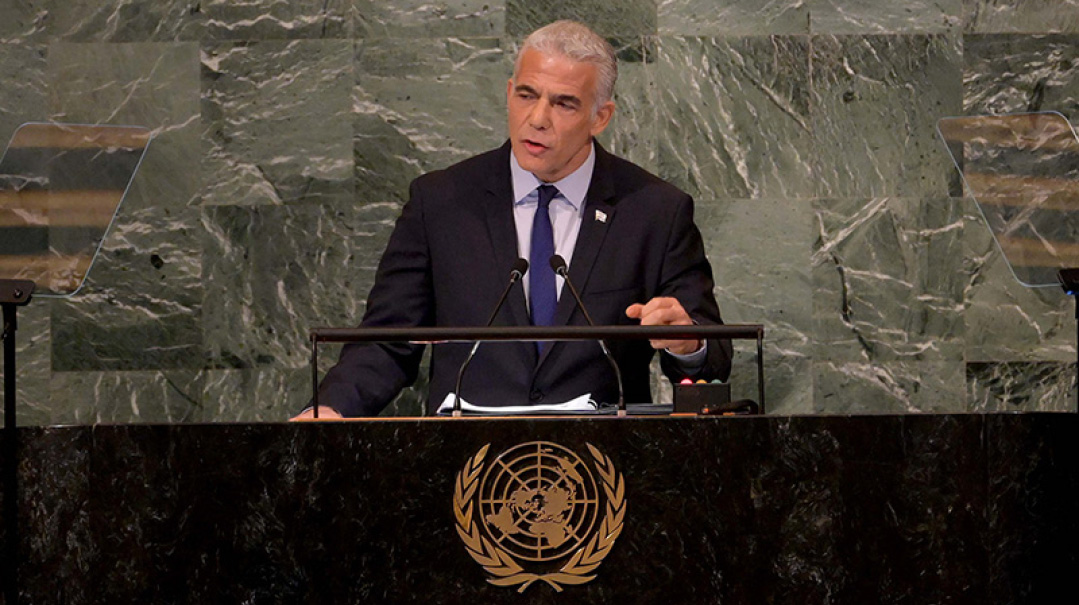
No More Empty Words
For an entire year, Netanyahu invested his whole being into bringing down the government and taking the country to elections. But if there’s anything that could lure Netanyahu from the campaign trail now, it would have to be the UN headquarters in New York, where, on Erev Rosh Hashanah, Yair Lapid arrived as Israel’s senior representative.
For a decade, the UN general assembly in New York was Netanyahu’s favorite platform. Bibi utilized his most prestigious international platform to warn again and again about the danger of Iran’s nuclear program.
Netanyahu describes his role as the guardian of Israel’s security. And as someone who sees the issue as his life mission, Bibi confides that he doesn’t sleep well at night while Lapid is mismanaging the battle against Iran with what he terms weakness and inaction.
Lapid gave a speech at the UN, where you warned for years of the danger of a nuclear Iran. We’ve heard claims — in the past from Naftali Bennett, and now from Lapid — that your government focused on words rather than actions.
“That’s nonsense. Even former chief of staff [Gadi] Eizenkot admitted that without our activities over the past decade, Iran would have had a nuclear weapon long ago. The head of the Mossad said that this deal is worse than its predecessor and ‘a strategic disaster.’ The deal says that we’re very weak and that Iran is closer to the point where it will be able to enrich uranium without giving explanations to anyone. We’ll return to the tough policy I led toward Iran. For an entire year, Lapid did nothing about the Iranian nuclear deal. He failed to enlist the world, Congress, and American public opinion against Iran.”
Lapid counters: if we want to have an impact without making enemies of the administration, we have to discuss our disagreements behind closed doors and not air them in Congress.
“The opposite is true. Only a tough and determined struggle for American public opinion and Congress can avert a bad deal. Sadly, Lapid has done nothing over the past year, he’s incapable of it. One speech at the UN and a half-hearted tweet now and then makes no difference.
“A majority of the public agrees that he’s unfit for the job. Israel needs strong leadership that will end the policy of diffidence and surrender. We have to move from empty words behind closed doors to a massive PR campaign against the nuclear deal.
“This failure is a matter of life and death, and we’ll set it right.”
Heading for a Showdown
With elections only weeks away, in both Israel and the US, we followed up with Netanyahu on some questions relating directly to relations between the two allies, especially as pertains to the revised nuclear deal with Iran. Given the former prime minister’s propensity for locking horns with Barack Obama, we were curious if he would put his warm ties with Joe Biden on the line to try to upend the deal. Netanyahu was uncompromising and unapologetic in the views he expressed.
In his recent visit to Israel, we saw Biden going out of his way to greet you at the ceremony and telling you that he loves you. It’s no secret that you had a strained relationship with the Obama administration, in which Biden served as vice president. If you’re elected prime minister, will you be able to maintain a healthy working relationship with a Democratic president?
“President Joe Biden and I have been good friends for 40 years. When he visited Israel, he made a point of approaching me as everyone saw, and we had another meeting later. We had a warm and excellent meeting. We brought up some shared memories, we spoke about the global situation, and I thanked him for the deep personal friendship between us, but above all for his steadfast commitment to the State of Israel. I thanked him for following through when I requested additional funding for Iron Dome during Operation Guardian of the Walls, even though it wasn’t easy.
“He had our back in many scrapes through the years, but the main subject of our conversation during his last visit was of course the Iranian issue, and on that issue, Lapid has fallen asleep on his watch and done nothing, as I said.”
About the Iran issue, Lapid says that if you’re elected, you won’t be able to hold a dialogue with the Biden administration because — in his view — you harmed our ties with the Democratic Party and the tradition of bipartisanship.
“You just mentioned yourselves how our especially warm relationship stood out when he visited here. President Biden and I have been friends for 40 years, but to secure the next 40 years, we have to deal with the Iranian threat.
“What we need is one thing — and by the way, I said this to President Biden in his recent visit to Israel. I expressed my opinion regarding the danger of the deal, but I added that in any event, economic sanctions and even defensive measures won’t be enough — what’s needed is a credible military option, because without that, nothing will help. I expressed this view, and I’ll express it on every available platform, because that’s the responsibility of an Israeli prime minister in such a moment.”
If you become prime minister after the Knesset election in Israel and the November midterm elections in the US, will we see you once again fighting in the US Congress and Senate against the signing of a deal, opposing the administration’s actions?
“That’s the duty of a prime minister of Israel, his most important duty of all, to use his experience and connections to stop this deal that’s an existential threat to the state — and today everyone understands that the deal is dangerous, even those who disagreed with me at the time and believed that we should keep our mouths shut. And this is where having familiarity with American public opinion, knowing how to influence, becomes so important. And you have to go about it intelligently, which Lapid is not doing, because he doesn’t have that ability. He doesn’t have the experience and he doesn’t have the acumen.”
And you’re taking into account that you’ll get into a showdown with the administration?
“Even with the best of friends, it’s okay to have disagreements. In our latest meeting, I told President Biden that the deal is terrible, and he wasn’t surprised — he knows my position. I added that without a credible military option, the threat of Iranian nuclearization can’t be stopped, and if Iran isn’t deterred even by that, then the military option needs to be utilized. That’s my position, that’s my deep commitment, and when I return with G-d’s help to lead the State of Israel, I’ll stand on any platform and say what’s right and necessary for Israeli security with a clear voice.” —
(Originally featured in Mishpacha, Issue 931)
Oops! We could not locate your form.







